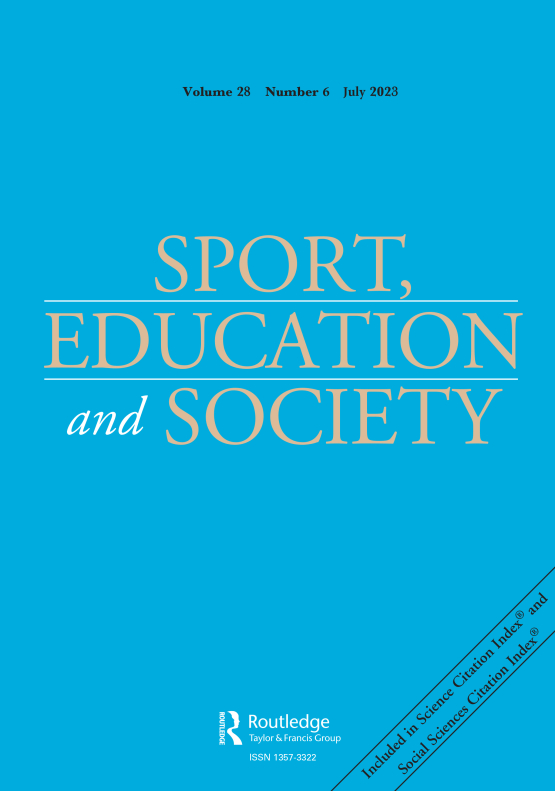Submit a Manuscript to the Journal
Sport, Education and Society
For a Special Issue on
Understanding and Enacting Embodiment: Insights for Educators and Researchers.
Abstract deadline
31 August 2024
Manuscript deadline
30 November 2025

Special Issue Editor(s)
Karen Lambert,
Monash University
[email protected]
Shirley Gray,
University of Edinburgh
[email protected]
Lisa Young,
Monash University
[email protected]
Justen O'Connor,
Monash University
[email protected]
Iselin Aartun,
Oslo Metropolitan University
[email protected]
Understanding and Enacting Embodiment: Insights for Educators and Researchers.
Embodiment lies at the heart of our movement experiences in and through the world. It demarcates a starting point for movement as well as a consequence of movement. The body as a site of/for learning has been explored for 1000s of years and yet as health and physical educators we find ourselves uncertain about what it actually means, how to begin with embodiment in mind, and importantly from an educational perspective, ways to engage and entice others through embodied practices and experiences.
The aim of this Special Issue is to broaden our understanding of the role embodiment plays in shaping the experiences, learning and outcomes of young people as well as the pedagogies and practices of educators in physical education, physical activity, sport and health education. The focus is on building a collection of research that can provide grounded and accessible insights to increase understanding of embodiment conceptually and practically. Accordingly the theme of this Special Issue is, Understanding and Enacting Embodiment: Insights for Educators and Researchers.
This Special Issue seeks to bring together a diversity of voices from physical education, physical activity, sport and health education who want to extend empirical and pedagogical understandings of embodiment. We are especially interested in innovative and/or creative research and empirical examples that explore embodied practices in school and physical education teacher education (PETE) settings.
Whilst we are keen to have a broad focus for this Special Issue, some suggested topics include:
- Embodiment as a lens to analyse/critique/understand Health and Physical Education (HPE) curriculum, practice, pedagogy and assessment - e.g., how to make sense of curriculum and classroom practice, pedagogy and assessment?
- Embodiment as a framework to plan curricula in Health and Physical Education (HPE) - e.g., how to plan and design an embodiment focussed unit/lesson/episode?
- Embodiment and assessment - e.g., how do educators and researchers assess/capture embodiment/embodied learning?
- Embodied learning - e.g., how do educators, researchers and young people define embodied learning? What does it look like? How does it happen
- Teaching and learning in embodied ways - e.g., how can embodied learning experiences be facilitated?
- The role of embodiment in informal or alternative sport - e.g., what role does embodiment play in informal and/or alternative sport settings?
- Embodiment as a lens to explore questions of social justice, inequality and inequity - e.g., how are embodied identities created and negotiated
- Embodiment and culture - e.g., what can be learned from First Nations people’s understanding of the body, embodiment and learning?
- Bridging the gap between theory and practice/overcoming mind body dualism- e.g., how can mind-body and theory-practice dualisms be addressed in physical education and sport?
- Embodiment and its relationship with learning and meaningful movement - e.g., what is the link between meaning making, learning and embodiment?
- Empirical reflections on teacher embodiment and its influence in teaching contexts
Innovative methodological approaches to collecting data with an embodiment focus - e.g, what innovative methodological approaches advance understandings of embodiment in physical education and sport? - Engaging young people in/through embodiment - e.g., how might educators or researchers introduce embodiment and embodied learning to young people and involve them in decision making processes?
Looking to Publish your Research?
Find out how to publish your research open access with Taylor & Francis Group.
Choose open accessSubmission Instructions
Submission deadlines
We encourage submissions from individuals at all stages of careers, including doctoral students and early career researchers, as well as more established scholars from within and outside of HPE fields.
All submissions should be a maximum of 7000 words including references.
All papers will be subject to blind review by a minimum of two referees. Neither acceptance nor place in the special edition is guaranteed. If necessary, the special edition will run over two SES issues.
The deadlines for submission are as follows.
Abstracts (approximately 300 words) submitted to the Guest Editors SES by 31st August 2024
Confirmed 30th September 2024
Paper submissions 31st May 2025
Final papers 30th November 2025